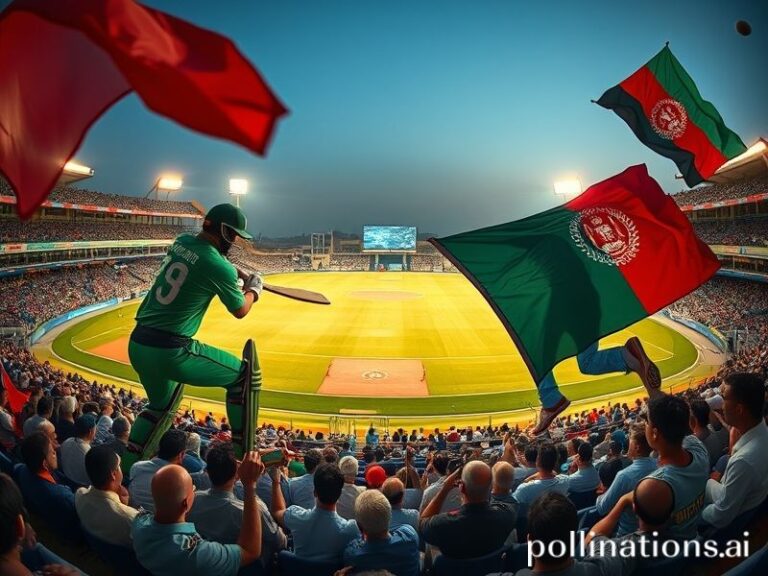Global Gridlock: How NYT Crossword Answers Became the World’s Most Smuggled Comfort
The Black-and-White Grid That Binds the Planet
By Our Correspondent in Exile, currently somewhere with spotty Wi-Fi and excellent coffee
It is 3:47 a.m. in Jakarta, 9:47 p.m. in Lagos, and 11:47 p.m. in São Paulo. Somewhere in each of those time zones a solitary glow emanates from a phone, a tablet, or—if the person is feeling nostalgic—a smudged newspaper. The object of their devotion is neither a vaccine tracker nor a crypto chart, but a 15-by-15 square of black-and-white tyranny known as the New York Times crossword. The answers, leaked, traded, or reverse-engineered, have become an illicit lingua franca for the world’s insomniac intelligentsia.
In theory, the puzzle is a celebration of American English—“faucet” not “tap,” “fanny pack” not “bum bag”—yet its appeal is oddly borderless. A banker in Geneva will WhatsApp “28-Down: ‘Small island republic’ = MALTA” to her cousin in Manila before the market opens. Meanwhile, a Russian literature grad in Tbilisi is arguing on Reddit that 45-Across (“Chekhov’s sister”) is a trap clue because Olga never appears in his major plays. The answers are tiny, smuggled contraband; they cross frontiers faster than passports and, unlike most contraband, they’re free—unless you count the soul you surrender to the paywall gods.
Why does a grid invented in 1942 still matter in 2024, when half the planet is busy trying not to melt or blow itself up? Because the crossword offers the one commodity scarcer than lithium: the illusion of control. While supply chains convulse and democracies flirt with autocoups, it is reassuring to know that 17-Across will always be “OREO,” no matter who wins the next election. The cookie is immutable; the republic is negotiable.
International espionage agencies have noticed. In 2019, an Australian Signals Directorate briefing—leaked, naturally—warned that “clue-sharing forums are ideal steganographic channels.” Translation: if you want to tell your handler in Caracas that the uranium deal is off, hide the message inside a rant about whether “ETTA” (James of soul) is overused. The analysts dubbed the scheme “Operation Cruciverbalist.” The spies themselves now solve the puzzle on the clock; the irony of being paid to decode what bored retirees crack over cornflakes is not lost on them.
Of course, the answers are no longer merely answers; they’re geopolitical mood rings. When “XI” appears as “China’s leader,” Twitter’s sinologists spend three days parsing whether the setter is kowtowing or trolling. If “TSAR” shows up twice in a week, Baltic editorialists see it as Kremlin psy-ops. And when “UKRAINE” is clued as “Breadbasket invaded in 2022,” even the most apolitical solver feels the chill of real-time history being shrink-wrapped into six neat squares.
Back in the Global South, the crossword has birthed micro-economies. In Nairobi, university students sell PDFs of solved puzzles for the price of a chapati. In Quito, an enterprising twelve-year-old runs a Telegram bot that auto-fills grids using open-source AI; his mother thinks he’s coding homework helpers, not undermining American soft power one three-letter river at a time. The World Bank, ever alert to new metrics, is reportedly studying whether crossword completion rates correlate with literacy spikes or simply with caffeine intake.
There is, inevitably, a backlash. French culture ministers—who once tried to ban the word “e-mail”—now denounce what they call “l’hégémonie carrée.” A German linguistics professor has written a 700-page treatise proving that crossword clues promote “Anglo-supremacist epistemologies,” which is academic for “English is winning, deal with it.” Even the Vatican has weighed in: last Lent, the Holy See’s newspaper published a sanctified Italian puzzle whose answers included “MISERICORDIA” and “DIGITAL DETOX,” a phrase that scans nicely but nobody believes.
Yet the grid persists, as stubborn as cockroaches and twice as smug. At Davos, delegates trade hints between panels on decarbonization; in Kyiv, subway commuters solve in the dark during rolling blackouts; in San Salvador, a gang truce was reportedly brokered when both clans realized they were stuck on the same Saturday stumper.
And so, dear reader, when you next Google “nyt crossword answers,” remember you are not cheating; you are participating in the last universally respected supply chain left standing. The clues may be trivial, but the communion is not. Somewhere tonight, a Syrian refugee and a Silicon Valley billionaire are staring at the same blank squares, equalized by the tyranny of 51-Across. The world burns, currencies collapse, glaciers calve—but somewhere, always, someone is whispering the word “EPEE” into the void. And for four minutes and thirty-two seconds, the void answers back.







